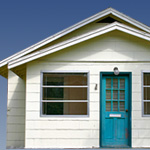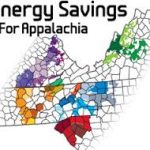Written by Rory McIlmoil
Rory McIlmoil
Rory is an energy policy and finance wonk with over a decade of experience working on energy policy and planning in Appalachia. He joined Appalachian Voices in spring 2013 as Energy Policy Director to head up our Energy Savings for Appalachia program. His dog, Hobo, is our official Boone office mascot.
The Power of Energy Efficiency — Building a Stronger Economy for Appalachia (Part 4)

This is the fourth installment in a five-part series illustrating the need for greater investments in residential energy efficiency as an economic driver in rural Appalachia. In this post, we explore the history and role of rural electric cooperatives, and explain why they should be doing more to help their members reduce their energy bills, and how they can overcome any barriers they face.
The Power of Energy Efficiency — Building a Stronger Economy for Appalachia (Part 3)
 Energy efficiency is merely one strategy that local governments, economic development agencies working with the rural electric co-op or municipal utilities might employ with the goal of diversifying the local economy. But the proven benefits of energy efficiency investments suggest it should be a key focus in any plan for local economic diversification.
Energy efficiency is merely one strategy that local governments, economic development agencies working with the rural electric co-op or municipal utilities might employ with the goal of diversifying the local economy. But the proven benefits of energy efficiency investments suggest it should be a key focus in any plan for local economic diversification.
The Power of Energy Efficiency — Building a Stronger Economy for Appalachia (Part 2)
 The small businesses, churches and schools you’re likely to find in a typical Appalachian town are pillars of their communities. But they’re not sources of significant employment. For most of rural Appalachia, poverty, high unemployment and the lack of economic diversity are persistent problems that have yet to be addressed in any comprehensive, effective manner.
The small businesses, churches and schools you’re likely to find in a typical Appalachian town are pillars of their communities. But they’re not sources of significant employment. For most of rural Appalachia, poverty, high unemployment and the lack of economic diversity are persistent problems that have yet to be addressed in any comprehensive, effective manner.
The Power of Energy Efficiency — Building a Stronger Economy for Appalachia (Part 1)
 When you think of poverty, what words do you associate with it? Many of us might think of words like “low-income,” “unemployment” or “homelessness.” Unfortunately, it is not often that we associate poverty with electricity costs, because for many across the United States, especially those living in the South and Appalachia, electricity costs play a significant role in worsening the impacts of poverty.
When you think of poverty, what words do you associate with it? Many of us might think of words like “low-income,” “unemployment” or “homelessness.” Unfortunately, it is not often that we associate poverty with electricity costs, because for many across the United States, especially those living in the South and Appalachia, electricity costs play a significant role in worsening the impacts of poverty.
On Heels of USDA Energy Efficiency Loan Program, Appalachian Voices Launches the Energy Savings Action Center
On Dec. 4, the U.S. Department of Agriculture…
How the Government Shutdown Effects Rural Energy Efficiency Programs
While many rural electric cooperatives are waiting eagerly…
Energy Efficiency Programs Survive the Government Shutdown
Although TVA is a government-owned electric utility, the…
USDA Finds Energy Efficiency Has No Significant Environmental Impact
On August 16, the U.S. Department of Agriculture’s…
As the Barn Burns, the House Stays Cold on Energy Efficiency
There has been much ado about energy efficiency…
“Help My House” pilot program helps low-income residents save money and energy in South Carolina
“On-bill financing” is a term typically used to…

